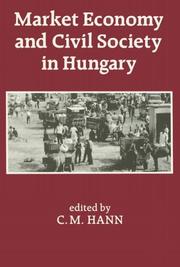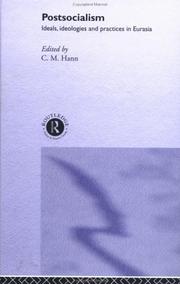| Listing 1 - 10 of 20 | << page >> |
Sort by
|

ISBN: 0714633968 Year: 1990 Publisher: London Portland Cass
Abstract | Keywords | Export | Availability | Bookmark
 Loading...
Loading...Choose an application
- Reference Manager
- EndNote
- RefWorks (Direct export to RefWorks)
316.3 <439> --- Capitalism --- -Civil society --- -Informal sector (Economics) --- -Hidden economy --- Parallel economy --- Second economy --- Shadow economy --- Subterranean economy --- Underground economy --- Artisans --- Economics --- Small business --- Social contract --- Market economy --- Profit --- Capital --- Sociale structuur --(sociologie)--Hongarije --- Hungary --- Economic conditions --- -Social conditions --- -316.3 <439> --- -Sociale structuur --(sociologie)--Hongarije --- 316.3 <439> Sociale structuur --(sociologie)--Hongarije --- -Capitalism --- Civil society --- Informal sector (Economics) --- Hidden economy --- Social conditions
Book
ISBN: 048511464X Year: 1994 Publisher: London ; Atlantic Highlands, NJ : Athlone Press,
Abstract | Keywords | Export | Availability | Bookmark
 Loading...
Loading...Choose an application
- Reference Manager
- EndNote
- RefWorks (Direct export to RefWorks)
Social change --- Changement social --- Case studies. --- Cas, Etudes de --- 316.4 --- -Change, Social --- Cultural change --- Cultural transformation --- Societal change --- Socio-cultural change --- Social history --- Social evolution --- Sociale processen --- Case studies --- -Sociale processen --- 316.4 Sociale processen --- -316.4 Sociale processen --- Change, Social

ISBN: 0415083222 0203396448 1138178284 0203392671 1280053879 1134889399 Year: 1992 Volume: vol 31 Publisher: London New York Routledge
Abstract | Keywords | Export | Availability | Bookmark
 Loading...
Loading...Choose an application
- Reference Manager
- EndNote
- RefWorks (Direct export to RefWorks)
Socialism as a political system may be on the wane, yet no one can doubt that its cultural legacies will make themselves felt for years to come, and on a worldwide scale. The contributors to this volume adopt a variety of anthropological approaches to illuminate changes which have removed socialists from power in many countries. Presenting detailed ethnographic accounts across a wide range of countries, they bring out the factors which have given socialism such a profound worldwide impact, including a substantial impact upon the discipline of anthropology itself. The first sustained and wide
Ethnology --- Socialism and culture --- Socialism --- Congresses. --- Cross-cultural studies --- Congresses --- Socialism and culture - Congresses. --- Socialism - Cross-cultural studies - Congresses. --- Ethnology - Congresses. --- Marxism --- Social democracy --- Socialist movements --- Collectivism --- Anarchism --- Communism --- Critical theory --- Culture and socialism --- Culture

ISBN: 0415262577 0415262585 Year: 2001 Publisher: London ; New York, NY : Routledge,
Abstract | Keywords | Export | Availability | Bookmark
 Loading...
Loading...Choose an application
- Reference Manager
- EndNote
- RefWorks (Direct export to RefWorks)
Post-communism. --- Social history --- Postcommunisme --- Histoire sociale --- POSTSOCIALISME --- SYSTEMES POLITIQUES --- P.E.C.O. --- PROBLEMES DE LA VIE INTERNATIONALE --- REGIMES POLITIQUES --- CEI --- TRANSITOLOGIE
Book
ISBN: 9633862884 9789633862889 9789633862872 9633862876 Year: 2019 Publisher: Budapest New York
Abstract | Keywords | Export | Availability | Bookmark
 Loading...
Loading...Choose an application
- Reference Manager
- EndNote
- RefWorks (Direct export to RefWorks)
Karl Polanyi's "substantivist" critique of market society has renewed topicality in the era of neoliberal globalization. Polanyi (1886-1964) is popular among critical theorists and radical political economists, but also with ecological activists, anti-globalization campaigners and all who sense that ongoing financial turmoil is symptomatic of a deeper crisis threatening the compatibility of capitalism and democracy. The author reclaims the polymath Karl Polanyi for contemporary anthropology, especially economic anthropology. The book furthermore takes his ideas back to Central Europe, where he grew up. The Polanyian approach is applied to the communist economy, with particular reference to the "market socialist" economy which evolved under János Kádár in Hungary. The same lens is used to investigate the consequences of the demise of communist power since 1990, primarily on the basis of ethnographic investigations in Hungary and South-East Poland. Stretching the discussion on Polanyi's great transformation -- for which there is considerable international interest -- in the context of neoliberalization onto the concept of Eurasia, and then bringing this into conversation with the rise of neo-nationalism in Hungary and Poland and beyond as the form that the great transformation is currently taking in the region, relates Hann's work powerfully to the current political turbulence.
Capitalism --- Economists --- Social scientists --- Market economy --- Economics --- Profit --- Capital --- Polanyi, Karl, --- E-books --- Anthropology, Communism, East-central Europe, Ethnography, Minorities, Postcommunism, Sociology.
Book
ISBN: 0300033532 Year: 1985 Publisher: New Haven (Conn.) : Yale university press,
Abstract | Keywords | Export | Availability | Bookmark
 Loading...
Loading...Choose an application
- Reference Manager
- EndNote
- RefWorks (Direct export to RefWorks)
Ukrainians --- Villages --- Case studies. --- Wisłok (Poland) --- Poland --- Social conditions. --- Ethnic relations. --- Rural conditions
Book
ISBN: 1800732260 1800732252 Year: 2021 Publisher: New York, New York ; Oxford : Berghahn,
Abstract | Keywords | Export | Availability | Bookmark
 Loading...
Loading...Choose an application
- Reference Manager
- EndNote
- RefWorks (Direct export to RefWorks)
Primarily on the basis of ethnographic case-studies from around the world, this volume links investigations of work to questions of personal and professional identity and social relations. In the era of digitalized neoliberalism, particular attention is paid to notions of freedom, both collective (in social relations) and individual (in subjective experiences). These cannot be investigated separately. Rather than juxtapose economy with ethics (or the profitable with the good), the authors uncover complex entanglements between the drudgery experienced by most people in the course of making a living and ideals of emancipated personhood.
Book
Year: 1967 Publisher: London Her Majesty's stationery office
Abstract | Keywords | Export | Availability | Bookmark
 Loading...
Loading...Choose an application
- Reference Manager
- EndNote
- RefWorks (Direct export to RefWorks)
Book
ISBN: 9780520260566 9780520260559 0520260562 0520260554 Year: 2010 Publisher: Berkeley : University of California Press,
Abstract | Keywords | Export | Availability | Bookmark
 Loading...
Loading...Choose an application
- Reference Manager
- EndNote
- RefWorks (Direct export to RefWorks)
Orthodox Eastern Church --- Congresses. --- Europe, Eastern --- Europe de l'Est --- Religious life and customs --- Congresses --- Vie religieuse --- Congrès --- 316:281 --- 269*2 --- Sociologie --(algemeen)-:-Oosters christendom --- Volksreligie. Volksgodsdienstigheid --- Eastern Orthodox Church --- Pravoslavnai︠a︡ vostochnai︠a︡ t︠s︡erkovʹ --- Holy Orthodox Catholic Apostolic Church --- Holy Orthodox Eastern Catholic and Apostolic Church --- Greek Church --- Orthodoxos Katholikē Ekklēsia --- Orthodoxos Katholikē kai Anatolikē Ekklēsia --- Kanīsah al-Sharqīyah --- Tung cheng chiao --- Kanīsat al-Masīḥ al-Sharqīyah al-Urthudhuksīyah --- Biserica Ortodoxă --- .كنيسة الشرقية الارثوذكسية --- East Europe --- Eastern Europe --- 316:281 Sociologie --(algemeen)-:-Oosters christendom --- 269*2 Volksreligie. Volksgodsdienstigheid --- Congrès --- Frömmigkeit. --- Ostkirche. --- Ethnologie. --- Orthodoxe Kirche. --- Religiöses Leben. --- Sozialanthropologie. --- christianisme --- Eglise orthodoxe --- Ortodoxa kyrkor. --- Orthodox Eastern Church. --- Europe, Eastern.
Book
ISBN: 1782386955 1785338366 1782386963 9781782386964 9781782386957 9781785338366 Year: 2015 Publisher: New York : Oxford : Berghahn,
Abstract | Keywords | Export | Availability | Bookmark
 Loading...
Loading...Choose an application
- Reference Manager
- EndNote
- RefWorks (Direct export to RefWorks)
Self-sufficiency of the house is practiced in many parts of the world but ignored in economic theory, just as socialist collectivization is assumed to have brought household self-sufficiency to an end. The ideals of self-sufficiency, however, continue to shape economic activity in many post-socialist areas. This volume's six comparative studies of post-socialist villages in Eastern Europe and Asia illuminate the enduring importance of the house economy, which is based not on the market but on the order of the house. These formations show that economies depend not only on the macro institution
Households --- Self-reliant living --- Post-communism --- Economic aspects --- Self-reliant lifestyle --- Self-sufficiency --- Alternative lifestyles --- Human ecology --- Population --- Families --- Home economics
| Listing 1 - 10 of 20 | << page >> |
Sort by
|

 Search
Search Feedback
Feedback About UniCat
About UniCat  Help
Help News
News